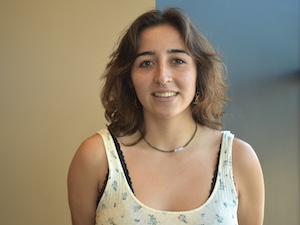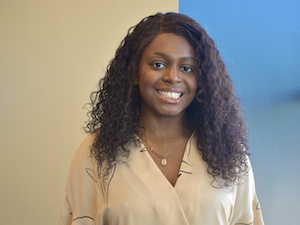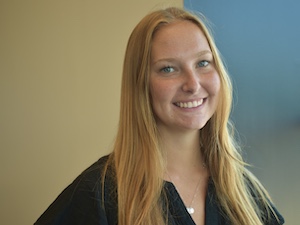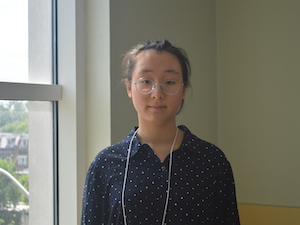2022 Week 1: Healthcare
Fatima Baloul | Shepherd’s Clinic
Shepherd’s Clinic is a free, comprehensive clinic for the uninsured in Baltimore. Patients are provided with clinical services [ primary and / or specialty care ], behavioral health services, and mindfulness programs. Given that all the providers, nurses, and a majority of the staff at Shepherd’s Clinic are solely volunteers, I truly encountered the most kind-hearted and well – intended individuals amidst my first week. I observed as my wonderful and compassionate supervisor, Jenny, welcomed each patient with so much hospitality every day, and I witnessed as she knew each Shepherd’s patient’s name and story by heart, without needing to refer to their charts or records. I recognized how upon entering the clinic, the patients’ shoulders eased and relaxed, their facial expressions filled with joy and gratitude. On Thursday, I received a call from a patient that hoped to reschedule an appointment. Once I confirmed with the patient the details of their rescheduled appointment, they began to thank me profusely. They were so appreciative of such a simple task. And, at that point, I knew Shepherd’s Clinic was among the few times that these disadvantaged, uninsured patients experienced quality, inclusive, and accessible healthcare, but beyond that, they felt heard in the clinic by the patient coordinator ( my incredible supervisor ), the providers, the nurses, and the volunteers. The patients and the wonderful and genuine volunteer staff are the backbone of the clinic, and I am so beyond thankful to be placed at Shepherd’s.
 Emma Bocanegra | Esperanza Center
Emma Bocanegra | Esperanza Center
After the first week of working at the Esperanza Center, I can already tell that I’m going to grow a lot from holding this position. My supervisor is aware that I’m a little nervous speaking Spanish professionally, and she knows that it’s also one of my goals to improve in this area over the course of the summer. After the first few days of just getting used to some of the databases and systems the clinic uses to track patients and appointments, my supervisor asked me if I’d feel comfortable answering the phone for the last few hours of the day. I explained to her that I was particularly anxious about speaking over the phone in Spanish, since pauses in conversation feel less natural. I also expressed that since people could call the clinic for so many different reasons, I was worried about the lack of context that I sometimes rely on if a person uses a phrase or words that I’m not familiar enough with. I braced myself to hear my supervisor’s frustration or disappointment that I was unable to help with this seemingly simple task. However, she was extremely kind and expressed that it was totally fine that I didn’t feel ready to answer phone calls yet, which I was both relieved and grateful to hear.
What I’m probably even more grateful for is that she didn’t let me remain in my comfort zone. As that same day came to a close, my supervisor told me she wanted me to take a small step forward and make a few phone calls to Spanish speaking patients informing them of their new appointments that had been scheduled, which would be a much simpler task considering there would be a fairly straightforward script I could mentally work through while on the call. Even though this task felt much more manageable to me, I was still nervous to embarrass myself or find myself at a loss for words, but my supervisor encouraged me and reassured me that this was something I was capable of. The phone calls ended up being completely fine, and I’m very excited to continue pushing the boundaries of my comfort zone through my time at the Esperanza Center this summer.
 Dumebi Nwankwo | MOMCares
Dumebi Nwankwo | MOMCares
This week showed me the difficulty in not overextending / overpromising when working with nonprofits. Overall I am having such a warm and welcome experience with MOMCares. Although I haven’t fully interacted with community, I have had the chance to speak to some young mothers here in Baltimore. During the interview process for the young mothers program, I had to stress attendance being mandatory because we are grant-funded. Repeatedly I asked if they had “reliable” transportation. In response, many of them stated they would take the bus, others asked if we provide transportation as they had many kids. Our summer program unfortunately cannot fund transportation, but everytime I asked I felt like I wanted to do something to alleviate that burden, but unfortunately I couldn’t. The young mothers program runs from 4-7 and it is unique in that it aims to serve all parts of Baltimore. The community work done by MOMCares is extraordinary for that alone. Unfortunately, a part of me sank thinking about how some of the expecting mothers were still minors and the time spent on the bus and the cost for everyday transport really does add up. I wished I could promise that we would find a solution to even the monetary barrier of public transportation (a 31-day pass is $74 and expected to increase), but I couldn’t. I spent hours off working looking for transportation vouchers or discounts with nothing to show for. Even from my two days of in person work, I could see the unreliability of certain MTA buses. Overall I felt a bit frustrated because I know that there will always be barriers to certain aspects of life and you can’t address everything, but I wish I was able to do more.
 Stacey Tang | Healthcare for the Homeless
Stacey Tang | Healthcare for the Homeless
Home is defined as “one’s place of residence, a familiar or usual setting, congenial environment and a place of origin”. To be at home is “to be relaxed and comfortable, at ease and in harmony with surroundings, and on familiar ground”.
What these dictionary definitions of home do not specify is that all of us “reside” in three homes: the home of self (the home of our being and identity), the home we live in (not just the physical structure of a home but also the environment we create within in), and the home of our larger community.
My first week at my placement was spent going through orientation material specific to HCH. The orientation covered a wide array of topics, including the history of the organization, trauma informed care, harm reduction, health equity and the challenges that those experiencing homelessness face, but what resonated the most was the notion of the three homes which was introduced when discussing effective engagement with homeless populations. We all might have moments in life when it feels like these homes we reside in are breaking, but thinking about the three homes I reside in and the moments when they were cracking has made me recognize the privileges I have as a student in this program.
For instance, after BITES this past week, I felt a piece of my home of self breaking. While the space to reflect with my fellow cohort members was very valuable, I couldn’t help but think about my lack of confidence in my “why” for being in this space and how talking, listening and being in the same space with those around me tore apart some of the values and ideologies I thought I embodied and believed in. While some of these cracks haven’t been fixed, I am still able to go home to my apartment with my supportive and loving roommates and live a life that is moderately fulfilling. The intrusions into my home may be uncomfortable and distressing, but not enough for my house of self to completely crumble. In my opinion, that in itself is a privilege.
In the orientation materials that were presented to me this week, it is clear that many people experiencing homeless do not have a single home they reside in. As stated in the material, those that are facing homeless “often do not feel ‘at home’ in their own bodies, minds and souls, have no housing to call home, and are disaffiliated from a meaningful role and purpose in the larger community”. When comparing these feelings to the small cracks I have experienced, it was difficult to process just how challenging it is for those experiencing homelessness to live and made me realize why it is so crucial to approach others with empathy and advocate for support systems such as Housing First. Reaching out to people where they are rather than from a higher pedestal can give those the opportunity to experience a taste of being a home. Our relationships with those around us play such a huge role in making a house a home, and in the work I will do in CIIP and beyond, that is something I strive to accomplish.
 Teagan Toomre | Keswick Multi-Care Center
Teagan Toomre | Keswick Multi-Care Center
One thing I’ve been seeing over and over again throughout this week at Keswick is how disadvantages compound. One area in which this has come to light has been in discharge meetings, where social workers, physical and occupational therapists, nurses, and dieticians join together to discuss patient discharge, their progress, and address any concerns of the patients and families. On the rehabilitation floor of Keswick, where people stay for short periods of time after an accident or other health emergency before returning home or to another care facility, this was especially apparent as patients and their families worked to return to their previous standard of independence and maneuvered through necessary steps to do so.
For example, many people in Baltimore City live in multistory rowhomes, with steps leading into the home and often lacking a floor with a bathroom, kitchen, and living area. Before a fall or other circumstance-altering event, these people, even older adults, often had no problem moving about their homes. However, an unforeseen injury changes everything. Many of the people were now struggling physically to walk or stand, things they had no issue with prior. They also had mounting medical bills from their hospital stays and now rehabilitation. In addition, their homes were no longer suitable for them to live in and would require substantial investment to either adapt the floor plan to allow for single-floor living or move to a suitable home, sometimes with family or friends or in a new apartment. Families and friends suddenly needed to serve as caretakers or hire full-time help while also working to pay off expenses. And, to top it all off, there was a large fee just to transport a discharged patient to their home.
While medical care is unreasonable expensive and stresses even the wealthiest Baltimoreans, the compounding requirements of medical bills and care provision prove to place an unbelievable burden on those with less access to medical insurance, stable housing and jobs, generational wealth, and social support. Intersectional dearths of privileges afforded to people place a sort of exponential burden on less fortunate members of society in the event of an emergency.
 Sellina Yoo | MERIT
Sellina Yoo | MERIT
This week was orientation at MERIT, and I really appreciated the approach that they took. Because all of us were not extremely familiar with teaching subjects first-hand to high-schoolers, they took a multi-faceted approach to ease us into the how-tos of educating, while also going behind the why of MERIT and how each of us will contribute to MERIT’s impact. Most notably, the interns were given three readings to look over called “The Rationale for Diversity in the Health Professions,” “State of Health in Baltimore 2017,” and “Baltimore City Health Disparities Report Card.” I felt like these three readings were incredibly powerful. From these three readings, I learned that vulnerable minority populations feel more comfortable with practitioners from their own racial or ethnic group, due to ease of communication and trust. This will increase the number of people who seek out healthcare access, leading to improved health outcomes. Also, these professionals are more likely to advocate for policies and programs for these populations, therefore increasing healthcare access and quality, and ultimately health outcomes for these populations as well. I think this reasoning that they provided really solidified my confidence in MERIT, as I can see how by all of us helping support these future health professionals and instilling the idea of becoming “change agents” in their curriculum, contributes to decreasing Baltimore’s health disparity. I also loved how MERIT is conscious that they are approaching high schoolers, who are in a turbulent time in their lives. MERIT values the students’ wellbeing and mental health, which is also an important issue to discuss. Interns and staff work together to accommodate stress levels, incorporate mental health breaks through engaging and stimulating activities, and provide mentor support to offer each student a feeling of family. I love how throughout the week, MERIT continuously emphasized that the program’s students, staff, and interns are all one big family, and we have to lean on and guide each other to success. This made me more excited to work with MERIT, as I truly felt seen and appreciated, while also supported, in my work both individually and with my peers.
